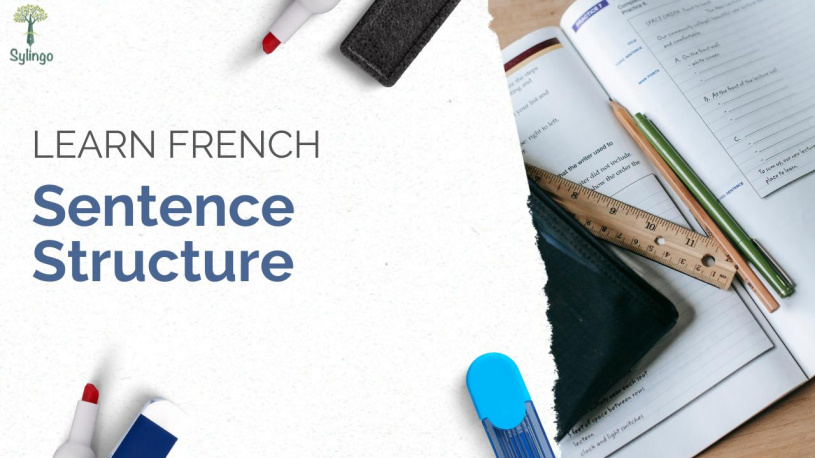Learning the structure of sentences in French is fundamental for anyone aiming to master the language. French, like many other languages, has its own set of rules and conventions when it comes to constructing sentences. Understanding these rules will not only help you communicate effectively but also enhance your overall proficiency in the language.
Sentence Structure in French:
1- Simple Sentences (Les phrases simples).
2- Compound Sentences (Les phrases composées).
3- Complex Sentences (Les phrases complexes).
In this lesson, we will learn about simple and compound sentences.
1- Simple Sentences (Les phrases simples):
These are sentences that consist of one part, and they have two types:
1- Verbal Sentence (La phrase verbale):
It is a sentence that contains one verb:
Subject - Verb - Sentence complement
Examples:
- Je mange une pomme. (I eat an apple.)
2- Nominal Sentence (La phrase nominale):
It does not contain any verb.
Examples:
- Plat principal. (Main dish.)
- Belle voiture! (Beautiful car!)
2- Compound Sentences (Les phrases composées):
The compound sentence consists of two independent parts, either coordinated or juxtaposed, and therefore contains two verbs, and it has two types:
1- Compound Sentence with Coordinated Parts (Deux propositions coordonnées):
When the sentence consists of coordinated parts, the parts are linked using one of the following coordinating conjunctions:
| Mais | but |
| Ou | or |
| Et | and |
| Donc | so |
| Ni | nor |
| Car | because |
Examples:
- J'ai faim mais je n'ai pas envie de manger ce plat. (I'm hungry but I don't feel like eating this dish.)
- Je dois aller à l'aéroport maintenant car ma mère arrivera à 11h. (I have to go to the airport now because my mother will arrive at 11.)
2- Compound Sentence with Juxtaposed Parts (Deux propositions juxtaposées):
When the sentence consists of juxtaposed parts, we use punctuation between the parts.
Examples:
- Nous sommes allés en vacances cet été, nous nous sommes bien amusés. (We went on vacation this summer, we had a great time.)
With this, we have learned about simple and compound sentences.
Note:
Sentences in French always start with a capital letter and end with:
1- (.) In the case of a regular sentence, for example:
- Je suis étudiant. (I am a student.)
2- (!) In the case of an exclamation, for example:
- Quel beau jour ! (What a beautiful day!)
3- (?) In the case of a question, for example:
- Quel âge as-tu ? (How old are you?)
The Subject in French:
It can be:
1- A noun - Un nom:
Examples:
- Pierre est un étudiant. (Pierre is a student.)
- Le professeur travaille à l'école. (The teacher works at the school.)
2- A personal pronoun - Un pronom personnel:
Examples:
- Il est un étudiant. (He is a student.)
- Elle travaille à l'école. (She works at the school.)
3- An interrogative pronoun / tool - Un pronom Interrogatif:
Examples:
- Qui parle français ? (Who speaks French?)
- Qui est là ? (Who is there?)
4- An indefinite pronoun - Un pronom indéfini:
Indefinite pronouns that can replace the subject:
| Personne | Nobody |
| Chacun | Everyone |
| Les uns, les autres | Some, others |
| Tous | All |
| Quelqu'un | Someone |
| Tout le monde | Everybody |
Examples:
| Personne n'est là! | Nobody is here! |
| Chacun à son tour. | Each in turn. |
| Quelqu'un est là? | Is someone here? |
| Tout le monde aime le chocolat. | Everybody likes chocolate. |
| Les uns s'occupent des enfants, les autres travaillent. | Some take care of the children, others work. |
| Tous ne travaillent pas en vacances. | Not everyone works on vacation. |
Understanding sentence structure is crucial for effective communication in French. By grasping the Subject-Verb-Object order, word order in questions and negations, and agreement between subject and verb, you'll be well on your way to constructing clear and accurate sentences in French. Keep practicing and immersing yourself in the language to further improve your skills!





